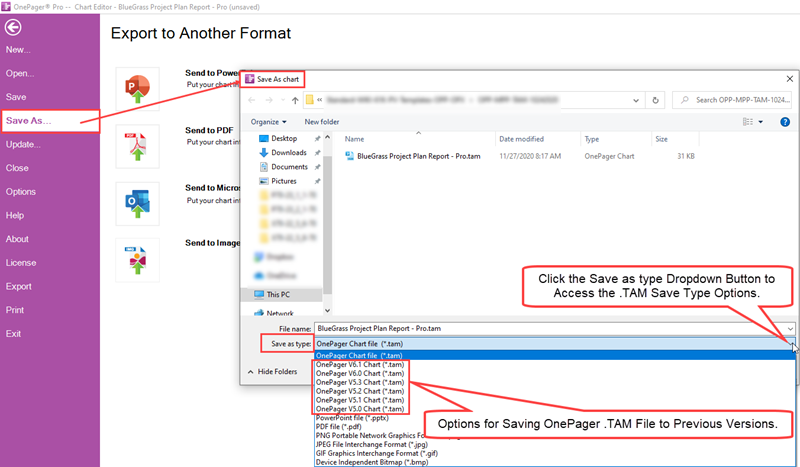Sharing via Other Applications (e.g., PowerPoint) for Version 7.0
Contents
About Sharing via Other Applications (e.g. PowerPoint)
Sometimes you want to share OnePager outputs by using PowerPoint slides, Word documents, messages, or on internal websites. When you are ready to distribute your OnePager visuals, you have several options.
Copy & Paste
Copy/paste snapshots from a chart into other Microsoft Windows applications via the Windows clipboard. This is one way to share via other Microsoft Office applications because it creates outputs that can be scaled in those other applications. Copy/paste can be more appropriate than sharing as a graphics image format such as .PNG because it transfers the chart in a scaleable vector format called Microsoft Windows Enhanced Metafile (EMF).
Click the Copy button as shown here:

When the OnePager document does not have multiple pages, clicking the Copy button itself (not the dropdown menu portion) places the entire chart document into the Microsoft Windows clipboard. If the OnePager document has multiple pages, you have three (3) options for placing OnePager output into the Microsoft Windows clipboard accessible by clicking the dropdown menu portion of the Copy button as shown below:

Entire Document
Selecting this copy option places the entire chart document, as displayed in the normal view mode, into the Microsoft Windows clipboard.
Current Page
The current page, in the context of a multiple page OnePager document, is the last page that you performed an operation on such as clicking on a task/milestone. You can make such page selections either in the normal view or the page break view modes. On making the selection of the current page option, that page is placed in the Microsoft Windows clipboard.
Specific Page
If Specific page option is selected, you see a form where you can select the page to be placed in the Microsoft Windows clipboard as shown below:

A message in the status bar at the bottom of the OnePager Chart Editor confirms that the image was copied to the clipboard as shown below:

Pasting The Clipboard Contents
Paste the clipboard contents into a PowerPoint slide, Word document, email message, or any other Windows application that supports pasting from the clipboard. The chart from OnePager is in a vector format, which means that you can resize it in PowerPoint, Word, etc. without losing the sharpness of the task bars, milestone symbols, decorations, and fonts.
Cautions
The size of the copied and pasted image from the OnePager Chart Editor is determined by its size in the Normal View Mode. If you zoomed the chart way out (i.e., made it small in the Chart Editor), the pasted image can be too small for PowerPoint, for example. Just to be safe, you should zoom in before copying to the clipboard.
Export of Single/Multi-Page Charts to Microsoft PowerPoint and PDF’s
OnePager version 5.3 and later have added capabilities to output charts as files that can be loaded into Microsoft PowerPoint and displayed as .PDF images using a suitable PDF reader. With a chart displayed in the Chart Editor, click the File tab on the OnePager ribbon tool bar and then click the Export tab which provides the following options:

Clicking the Send to PowerPoint button formats the chart as a Microsoft PowerPoint chart and bring up a Microsoft Windows Save As form as shown below:

Once saved, the file can be opened in Microsoft PowerPoint. A similar option is used for .PDF file exports. Click the Send to PDF button and a Microsoft Windows Save As form appears allowing you to save the formatted chart as a .PDF file.

Once saved, the .PDF file can be opened in Adobe Acrobat® or other PDF reader.
There is another way to save charts in a variety of formats using the Save As button on the ribbon’s File tab as shown in the figure above. When you click the Save As button, a form appears that allows you to select the Save as type: from the dropdown menu shown in the illustration below. Make sure that you establish the file save location as well as selecting the file save type before clicking the Save button on the form.

Print to Paper
You can distribute individual snapshots from a chart as a printed document, which includes .PDF files. Select the File tab on the ribbon and then select the Print tab as shown below:

The chart above is a multi-page chart. Clicking the Print button displaying the printer icon shown above accesses the standard Microsoft Windows Print form. From this standard form you can select (1) the pages to print, (2) the printer to use, and (3) any other special features implemented on the printer and available through the Preferences button.

Choose a printer and press the Print shown above. Printer settings can also be changed by selecting the Settings button shown on the Printing your chart page below. By doing so, OnePager displays the Chart Properties form’s Page Setup tab.

You can print to a .PDF file if you have a .PDF virtual printer installed, such as various Adobe® products and third-party products.
Related Links
Creating Multi-Page Charts (Portal)
(23.2.2.1-70)